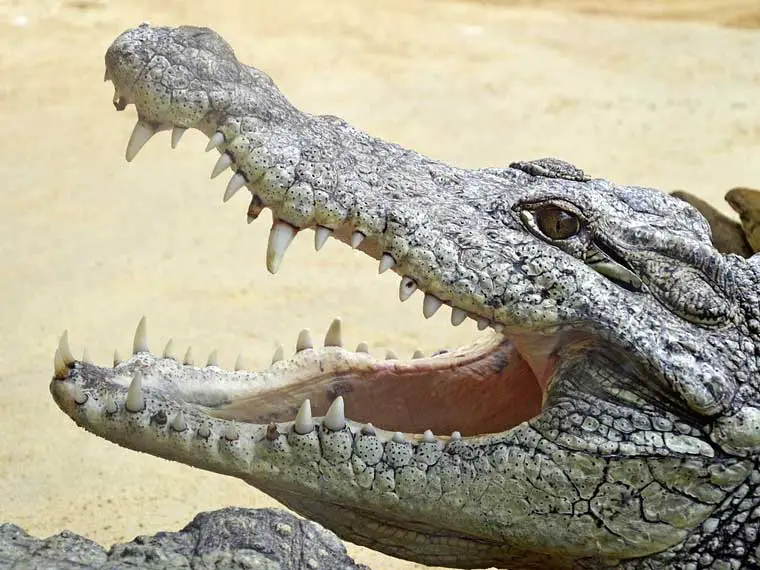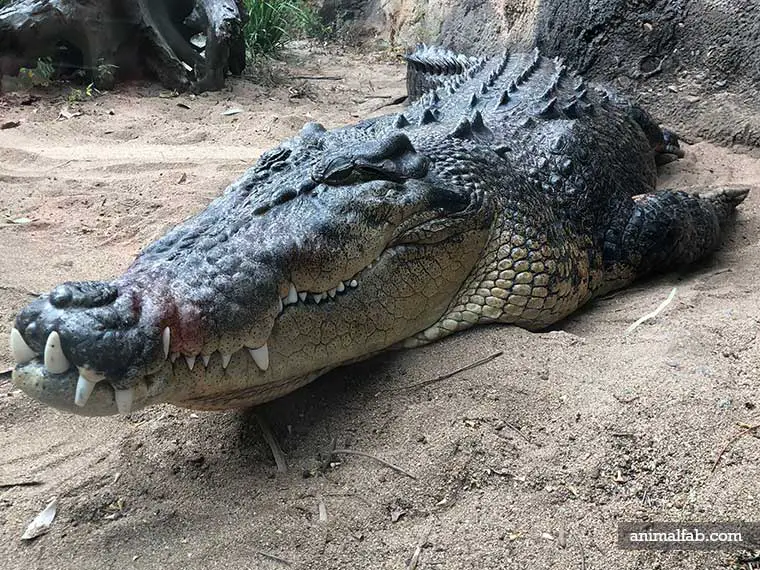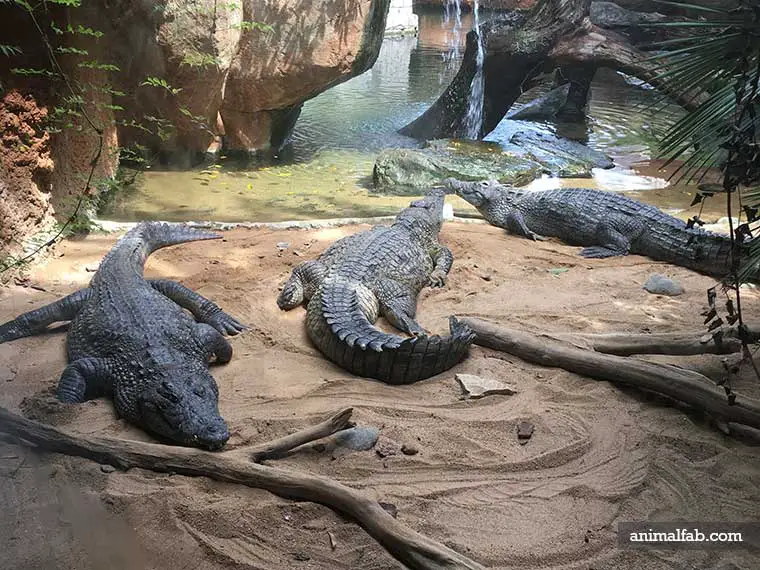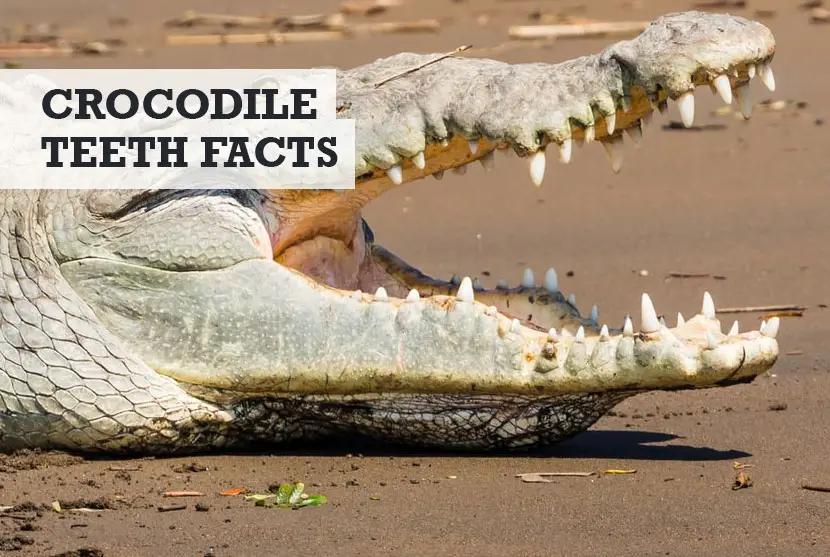If you’ve ever seen a crocodile open its mouth wide you might be surprised at how few teeth you see. Given they are known to be apex predators, you would expect a crocodile to have more teeth than that. But just how many do they have in their lifetime, and why so few?
How many teeth do crocodiles have? Larger adult species of crocodiles have anywhere between 60 to 72 teeth. However, other species of crocodiles may have as many as 110 teeth in total. In their lifetime, a crocodile might go through 2,000 teeth!
There’s so much more to it though, as crocodile teeth has some fascinating aspects to them. Below you can learn all the crocodile teeth facts you will ever need to know.
Crocodile teeth facts
With their sharp, dagger-like teeth, and extreme biting force (the strongest in the animal kingdom) crocodiles are intimidating dinosaur-like creatures who both humans and animals try to avoid wherever possible.
Paleobiologist Gregory M. Erickson and colleagues put all 23 living crocodilian species through an unprecedented bite test. Saltwater crocodiles—slammed their jaws shut with 3,700 pounds per square inch (psi), or 16,460 newtons, of bite force. By contrast, you might tear into a steak with 150 to 200 psi (890 newtons). Hyenas, lions, and tigers generate around 1,000 psi (4,450 newtons).
National Geographic
In captivity, crocodiles are easy to observe from a distance. Here you might have seen them basking in the sun with their mouths wide open and their rows of shiny white teeth on display.

How many teeth does a freshwater crocodile have?
The freshwater crocodile is a relatively small crocodile (averaging about 3 meters) and is only found in parts of Australia.
In general, they have around 68 to 72 razor-sharp teeth that they use to catch a variety of animals, such as fish, toads, and frogs.
How many teeth does a saltwater crocodile have?
Probably the most famous crocodile of them all, the saltwater crocodile is huge and has the greatest bite pressure of any animal on the planet.
On average, saltwater crocs have around 66 teeth in total which helps them to take down prey as large as water buffalos and baby elephants.
How many teeth does a dwarf crocodile have?
Native to western and central Africa, where they thrive in a variety of habitats, such as tropical rainforests, wet grasslands, and freshwater pools, dwarf crocodiles are a tiny nocturnal species of crocodile that enjoy spending their daylight hours tucked away in burrows.
When it comes to dentistry, dwarf crocodiles typically have around 30 to 32 teeth, much fewer than their larger and scarier African cousins, the saltwater and Nile crocodiles.
Why dwarf crocodiles have evolved with fewer teeth is unclear, although it might be related to their diet being comprised of smaller and more fragile prey – like fish, insects, lizards, and waterbirds.

How many teeth does a Nile crocodile have?
Nile crocodiles are Africa’s largest crocodiles and can reach a staggering maximum length of 20 feet, much longer than the saltwater crocodile, another species commonly found in Africa.
Like most large crocodilians, they have around 64 to 68 large and pointed teeth. Nile crocodiles are particularly dangerous to humans and as such, locals have learned to give them a wide berth when swimming and fishing.
How many teeth does a gharial have?
Gharials are an extremely rare large fish-eating species of crocodilian that are native to India. This species is famous for its long and narrow snouts that are designed to reduce their resistance in the water, thus helping them to chase down fish more effectively.
What’s more, they have more teeth than the average crocodile species; around 106 to 110 in total, those of which are incredibly thin and resemble tiny little daggers, providing gharials with the perfect tools to snag slippery fish.
How many teeth does a baby crocodile have?
Despite baby crocodiles having much smaller appetites than their larger adult counterparts, they still hatch with a rather impressive amount of teeth for a young reptile – around 60 to 80 individual teeth, depending on the species.
Additionally, baby crocs also begin their life with a special adaptation that is only found in certain species of reptiles, birds, and monotremes (platypuses and echidnas) – the egg tooth.
What is an egg tooth?
Although the inside of their mother’s egg is the perfect place for baby crocodiles to start their initial development, they will soon have to escape these confines if they want to avoid suffocating.
As they grow larger, baby crocodiles naturally require more oxygen, and the only way for them to get this is by hatching out into the big wild world. Thankfully, this task is made easier by the presence of their handy egg tooth.
Interestingly, the egg tooth isn’t a real tooth, it is a sharp piece of hardened skin that is located on the top of their snouts. Using this protrusion, the hatchling crocodiles will rub their face against the inner membrane of the egg until they manage to tear it apart.
From here, they will use their nose to push against the egg until they can break free of the outer part of the shell.
The baby crocodiles will stick their snouts into the air and remain still for a few hours until they are ready to completely leave the egg. At times, some baby crocodiles may need encouragement from their mother, who will take the egg in their mouth and gently push down on it, encouraging the baby crocodiles to finally break free.

What type of teeth do crocodiles have?
Crocodiles, unlike most species of animals, have heterodont dentition. Essentially, this means that their teeth are differentiated into different forms like incisors, molars, and canines, the same forms as human teeth.
However, in structure, their teeth are completely different from ours and are conically shaped, sharper, and pointed. They are also much stronger and specifically designed to resist the impact caused when they snap their powerful jaws together.
Can crocodiles grow teeth back?
Famous for their sharp and deadly gnashers, crocodiles are classified as a polyphyodont, a species of animal with the unique ability to replace their teeth. Unlike humans, crocodiles often lose or break their teeth when hunting or chomping down on the tough hides of prey.
Thankfully, this is not a problem for the ancient reptiles, as a new tooth will develop as soon as an old one is broken or lost. Interestingly, most crocs rarely have all their teeth at one time, and instead, continuously lose and grow them through the course of their lives.
How many teeth do crocodiles have in a lifetime?
Just like sharks do, crocodiles lose their teeth regularly meaning new ones must grow back through. With an average life span of 50 years, a crocodile can go through 40 teeth a year.
This means that a crocodiles can have up to 2,000 teeth in their life! If that’s not one of the craziest crocodile teeth facts, I don’t know what is.
How long are crocodile teeth?
Crocodile teeth will vary in size and length depending on the tooth type and species. The longest crocodile teeth will be the canines in the largest Saltwater crocodiles. These teeth can grow as long as 4 inches in very large specimens.
Can a crocodile grow teeth after losing one?
Yes, crocodiles do grow teeth after losing one. Whilst the Plover bird will clean a crocodile’s teeth, it’s not actually necessary. Crocodiles will get rid of bad teeth and replace them with new ones growing through.
Do birds clean crocodile teeth?
Another crocodile tooth fact is that some will have them cleaned by birds. The Egyptian Plover bird will fly into the mouth of a crocodile, eat any food stuck in and around the croc’s teeth, then fly away.
It’s beneficial to both species, as the crocodiles gets his teeth cleaned, and the Egyptian Plover bird gets a meal.
Conclusion
Crocodiles are found in many different tropical habitats around the world and are versatile and vicious hunters that can take on the largest of animals with little trouble.
But to see them with their mouth open, you would think they would have more teeth.
Well, that’s true in some respects, as over a lifetime, crocodiles can have 2,000 teeth. But in any one given moment in time, a crocodile will only have between 60 and 100 depending on the species.
You might also like…
- Why you can’t truly tame a crocodile
- How to hold a crocodile’s mouth shut
- Do hippos kill and eat crocodiles?
Image in header via https://unsplash.com/photos/JWalI-iIvo8

